Publications
 “e-democracy: who dares ?– (Proceedings of the 4th session of the Forum for the Future of Democracy, Madrid, 15-17 October 2008) - Pdf version “e-democracy: who dares ?– (Proceedings of the 4th session of the Forum for the Future of Democracy, Madrid, 15-17 October 2008) - Pdf version
|
The end the 20th century saw an unprecedented expansion of democracy on the European continent with the fall of the Berlin Wall and the Iron curtain. Today, practically all countries in Europe proclaim their commitment to the principles of pluralist democracy, human rights and the rule of law. At the same time, however, Europe’s democracies face serious problems such as steep decline in voter turnout, the decreasing influence of political parties and the rise of extremist movements.
The Forum for the Future of Democracy was set up by the 3rd Summit of Heads of State and Government of the Council of Europe (Warsaw, 2005) as a response to these problems and to develop ways to promote good practice among European democracies. It brings together all relevant actors (parliaments, governments, local and regional institutions, civil society and scholars) to “strengthen democracy, political freedoms and citizens’ participation”.
e-democracy: who dares? Contains the proceedings of the 4th session of the Forum (Kyiv, 21-23/108/2009). The aim of the session was to consider the impact of information and communication technologies (ICTs) on democracy. This volume explores the opportunities offered by e-democracy to improve the transparency, accountability and responsiveness of democratic institutions as well as to increase the accessibility and inclusiveness of democratic processes. The challenges and risks of e-democracy are also addressed.
|

|
Power and empowerment – The interdependence of democracy and human rights (Proceedings of the 3rd session of the Forum for the Future of Democracy, Stockholm/Sigtuna, 13-15 June 2007) – Pdf version
|
The end the last century saw an unprecedented expansion of democracy on the European continent with the fall of the Berlin Wall and the Iron curtain. Today, practically all countries in Europe proclaim their commitment to the principles of pluralist democracy, human rights and the rule of law. At the same time, however, Europe’s democracies face serious problems such as steep decline in voter turnout, the decreasing influence of political parties and the rise of extremist movements.
The Forum for the Future of Democracy was set up by the 3rd Summit of Heads of State and Government of the Council of Europe (Warsaw, 2005) as a response to these problems and to develop ways to promote good practice among European democracies. It brings together all relevant actors (parliaments, governments, local and regional institutions, civil society and scholars) to “strengthen democracy, political freedoms and citizens’ participation”.
The role of political parties in the building of democracy contains the proceedings of the 2nd session of the Forum, held in Moscow in October 2006. The aim of the session was to reflect on the role and responsibilities of political parties in finding democratic solutions to contemporary challenges, the interaction between political parties and with other actors in the democratic process, and the building and strengthening of democratic institutions.
|
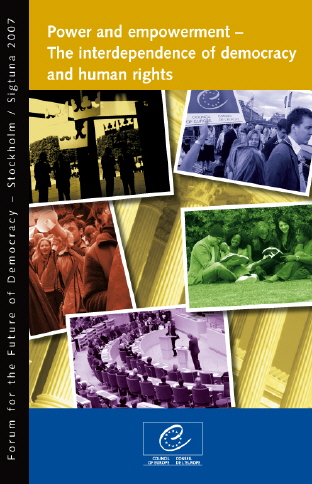
|
 “The role of political parties in the building of democracy” (Proceedings of the 2nd session of the Forum for the Future of Democracy, Moscow, 18-19 October 2006) – Pdf version “The role of political parties in the building of democracy” (Proceedings of the 2nd session of the Forum for the Future of Democracy, Moscow, 18-19 October 2006) – Pdf version
|
The end the 20th century witnessed an unprecedented expansion of democracy on the European continent with the fall of the Berlin Wall and the Iron curtain. Practically all countries in Europe today proclaim their commitment to the principles of pluralist democracy, human rights and the rule of law. At the same time, however, Europe’s democracies face serious problems such as steep decline in voter turnout, the decreasing influence of political parties and the rise of extremist movements.
The Forum for the Future of Democracy was set up by the 3rd Summit of Heads of State and Government of the Council of Europe (Warsaw, 2005) as a response to these problems and to develop ways to promote good practice among European democracies. It brings together all relevant actors (parliaments, governments, local and regional institutions, civil society and scholars) to “strengthen democracy, political freedoms and citizens’ participation”.
Power and empowerment – The interdependence of democracy and human rights contains the proceedings of the 3rd session of the Forum for the Future of Democracy, held in Stockholm/Sigtuna (Sweden) in June 2007. This session addressed issues such as the role and responsibilities of the opposition, representative democracy at the local and regional level, empowerment of the individual and non-discrimination, respect for freedom of expression and association for civil society, and fostering democracy, human rights and social networks.
|
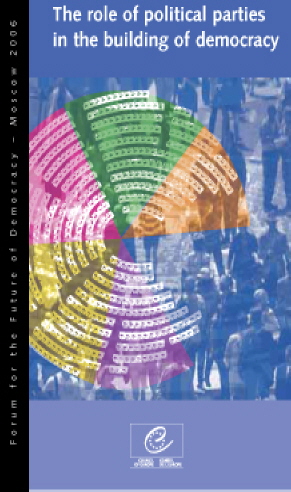
|
· Lunch meeting of the Forum for the Future of Democracy, Warsaw, 3-4 November 2005 – Speeches delivered Pdf version
|
The end of the last century saw an unprecedented expansion of democracy on the European continent with the fall of the Berlin Wall and the Iron Curtain. Today, practically all countries in Europe proclaim their commitment to the principles of pluralist democracy, human rights and the rule of law. At the same time, Europe’s democracies face serious problems, such as the steep decline in voter turnout, the decreasing influence of political parties and the rise of extremist movements.
The need to propose effective responses to these problems and promote exchanges of good practice amongst European democracies was recognised at the highest level during the 3rd Summit of Heads of State and Government of the Council of Europe, held in May 2005 in Warsaw. This led to the creation of the Forum for the Future of Democracy, which brings together all relevant actors (parliaments, governments, local and regional institutions, civil society and academics), at all levels, to strengthen democracy, political freedoms and citizens’ participation.
The first forum was held in November 2005 and focused on the topic of citizens’ participation. This booklet brings together the speeches delivered at the forum and should be of interest to anyone concerned with the state of contemporary democracy in Europe.
|

|
 Reflections on the future of democracy in Europe (Council of Europe, September 2005) – Click here to buy the book Reflections on the future of democracy in Europe (Council of Europe, September 2005) – Click here to buy the book
This book contains the major contributions to the Conference “the future of democracy in Europe” (Barcelona, November 2004), organised in the framework of the Council of Europe Project “Making Democratic Institutions Work” (2002-2004).
Click here for Pdf version
|
In 2004, experts from civil society, governments and academia came together in Barcelona at the Council of Europe’s conference on “The future of democracy in Europe” to discuss the challenges and opportunities facing contemporary democratic governments. In spite of the unprecedented and favourable context of democracy in Europe today, states are having increasing difficulty in meeting these challenges through their traditional institutions and arrangements. The objective of the conference, which marked the end of the three-year integrated project “Making democratic institutions work, was to debate proposals for democratic reform.
Reflections on the future of democracy in Europe contains major contributions to this conference. A broad range of topics was covered, including: more inclusive elections; the financing of political parties; deliberation mechanisms; popular initiatives and referendums; and, in particular, how modern communication technologies can affect the democratic process. The debate identified the types of changes needed to make governments more accountable, to offset political disengagement and to enhance incentives for citizens to participate in decision-making processes.
The conference concluded that democratic practice needs to be continually evaluated and renewed to adapt to new contexts. The participants also agreed that the Council of Europe should set up a forum for the future of democracy to promote reforms across Europe. The forum would act as a type of clearing house for exchanging new ideas and practices, and propose potential models that individual member states can adapt for their own use. Reforms should adhere to the core values of the Council of Europe’s acquis in this field, but be flexible enough to allow for the considerable institutional variety in the Organisation’s member states.
|
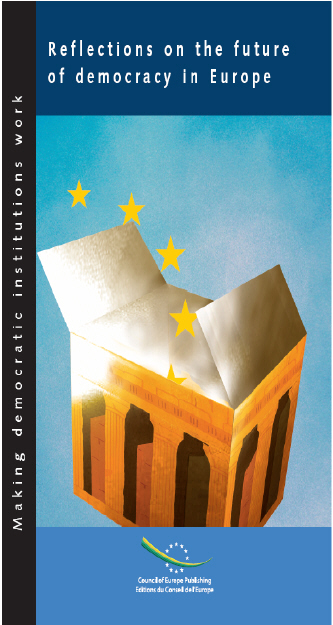
|
 The Internet Literacy Handbook (A guide for parents, teachers and young people) The Internet Literacy Handbook (A guide for parents, teachers and young people)
Third edition
|
Why create an Internet literacy handbook? Over the past decade, Internet technology, now merging into that of mobile technology, has transformed the multiple facets of life in society across the world, changing our work and leisure patterns, and placing greater demands on us as active, democratic citizens. The Internet literacy handbook, intended for parents, teachers and young people throughout Europe, is a guide to exploiting to the fullest this complex network of information and communication.
The handbook is comprised of 21 fact sheets, each covering a particular topic on internet use, from searching for information to setting up blogs through to e-shopping and e-citizenship, to name but a few. These fact sheets offer teachers and parents sufficient technical know-how to allow them to share young people’s and children’s voyages through communication technology. They highlight ethical and safety consideration, give insight into added value in education, provide ideas for constructive activities in class or at home, share best practice in Internet use, and provide a wealth of definitions and links to sites that give practical examples and further in-depth information.
|
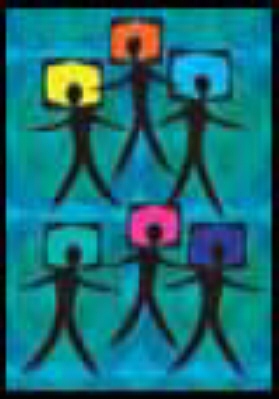
|
 Going for gender balance - click here to buy the book Going for gender balance - click here to buy the book
This book was commissioned by the Council of Europe’s Steering Committee for Equality between Women and Men (CDEG) and published as a contribution to the Integrated Project “Making democratic institutions work”. It also exists in Russian and Ukrainian and is forthcoming in Azeri and Georgian.
Click here for a pdf version: English, Russian
|
Going for gender balance is intended to be a practical ideas book. The first part of this guide reviews successful experiences and innovative ways of approaching balanced decision-making, giving examples in a range of countries, thus providing access to gender projects and initiatives which have rarely been disseminated. The book moves beyond electoral politics, which are by far the most documented and focuses on other groups which are also involved in social and economic decision making, such as trade unions and NGOs, thereby informing and inspiring activists in areas where the most work remains to be done. Part two focuses on persuasive communication techniques used to sensitise opinion leaders and the general public to issues of gender balance. The ultimate goal is to make gender balance second nature to European societies, thus today’s awareness-raising strategies – pre-election campaigns, media-sensitisation campaigns, networks, protest actions and “grass-roots cookie days” – will one day become artefacts from the past.
Going for gender balance was commissioned by the Council of Europe’s Steering Committee for Equality between Women and Men as part of its task of preparing methodologies for mainstreaming equality and proposing recommendations and examples of good practice to member states. It was published as a contribution to the integrated project “Making democratic institutions work”.
|
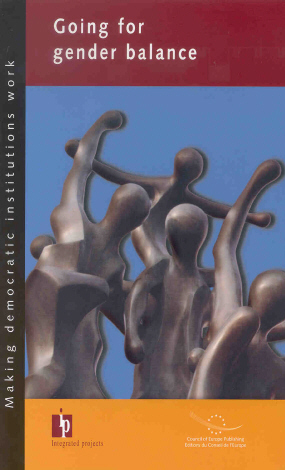
|
 Women’s individual voting rights – a democratic requirement - click here to buy the book Women’s individual voting rights – a democratic requirement - click here to buy the book
This book was commissioned by the Council of Europe’s Congress of Local and Regional Authorities of Europe (CLRAE) and published as a contribution to the Integrated Project “Making democratic institutions work”. It also exists in Russian, Macedonian, Albanian and Serbian.
Pdf versions available in : English, Albanian, Macedonian and Serbian
Identified as occurring in several of the new democracies in Europe during election observation missions carried out by the Council of Europe and the OSCE since 1995, family voting is a patriarchal custom that allows men to vote with or for women family members. Family voting deprives women of their right to a secret vote and contributes heavily to their marginalisation in political life.
Women’s individual voting rights – a democratic requirement sheds light on family voting through a general report on this persistent practice, including recommendations to combat it through a country by country report of examples observed by international organisations; and through Recommendation 111 (2002) of the Congress of Local and Regional Authorities of Europe on women’s individual voting rights.
Family voting is an issue which needs to be explored and dealt with more fully by those involved in gender equality in political decision making and it is hoped that this booklet, among other things, will facilitate this process.
This text, prepared by the Congress of Local and Regional Authorities of Europe, is published in the framework of the integrated project “Making democratic institutions work”.
|
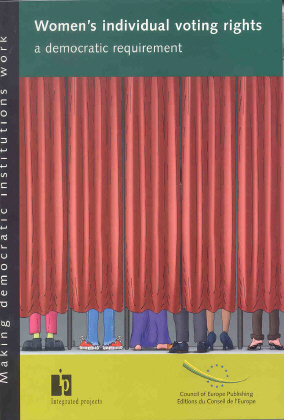
|
 Highway to democr@cy – the Council of Europe and the information society - click here to buy the book Highway to democr@cy – the Council of Europe and the information society - click here to buy the book
Click here for a pdf version
Any debate on the information society is necessarily a global one. Accordingly, Highway to democr@cy – the Council of Europe and the information society discusses diverse and opposing currents of thought on information and communications technology (ICT), which have formed the backdrop for work carried out by the Council of Europe.
This publication reviews the series of reports, documents, legal texts and publications the Council of Europe has produced on a broad range of ICTs over the last twenty years. The wide application of ICTs has transformed almost every aspect of life in our societies. This is reflected in Kate Oakley’s holistic approach to the subject, covering ICTs’ role in employment, economic growth, media, education, science and technology, law, cultural industries, as well as nascent fields such as e-voting and e-governance.
Kate Oakley is a writer and policy analyst specialising in the knowledge society and regional development. Her recent work has focused on e-governance, entrepreneurship and the cultural industry. She is an associate of the independent think tank Demos and a Fellow of the Royal Society of Arts in the United Kingdom.
|

|
 Guarding the watchdog – the Council of Europe and the media - click here to buy the book Guarding the watchdog – the Council of Europe and the media - click here to buy the book
Click here for a pdf version
Freedom of speech and access to information are basic rights which facilitate other rights and without which democracy cannot develop or be maintained. They underlie the development of pluralistic and independent media, the guarantors of the free flow of information necessary for cultural and political diversity. Since the late 1950s, the Council of Europe has supported media freedom through standard-setting agreements and conventions at European level, focusing at first on TV, radio and the written press. The Council successfully anticipated the importance of technological developments in this field by expanding its work to electronic media and satellite television, emphasizing, among other things, freedom of access for all.
Produced by the integrated project “Making democratic institutions work”, Guarding the watchdog reviews the Organisation’s work in this field from the 1950s onwards and provides the reader with a framework for understanding policy development and how important democratically regulated media are if we are to investigate, verify and expand upon the information we receive. This booklet also informs on the challenges facing European media policy today, such as freedom of speech in the context of globalised terrorism, journalists in conflict situations and the pressing issue of media concentration.
The author, Kayhan Karaca, is a journalist specialised in European issues. A regular contributor to the work of the Turkish Foreign Policy Institute, he has produced several television programmes and written television documentaries. He represents the Association of European Parliamentary Journalists at the Council of Europe.
|

|
 Genderware – the Council of Europe and the participation of women in political life - click here to buy the book Genderware – the Council of Europe and the participation of women in political life - click here to buy the book
Click here for a pdf version
It is a common misconception that the battle for gender equality in political life has been won. In most member states, women are significantly under-represented in local, regional and national decision-making bodies. On a Europe-wide level, they account for only 18% of parliamentary membership. Having little say in political decisions which may affect one’s life is incompatible with the principles of representative democracy.
Genderware traces the history of the Council of Europe policy on promoting women’s participation in political life, while placing it in the context of the Organisation’s overall work on gender equality. It describes the principles and methods behind policies, the institutional mechanisms on which they are based, and analyses the major topics involved. It concludes by discussing areas essential for future work: gender quotas for political parties, guaranteed social rights for women and the reinforcement of secularity.
The author, Mariette Sineau, a political scientist, is a research supervisor in this field at the Centre national de la recherche scientifique (French National Centre for Scientific Research) in Paris. Her current work is on the topics of women in political life and French election trends. Her most recent publication is Profession: femme politique. Sexe et pouvoir sous la Ve République (Paris, Presses de Sciences Po, 2001)
|

|
 Financing political parties and election campaigns - click here to buy the book Financing political parties and election campaigns - click here to buy the book
Click here for a pdf version
In recent years, a number of scandals linked to the financing of political parties have emerged in Council of Europe member states. The ensuing erosion of the credibility of parties and politicians has demonstrated that this issue must be addressed urgently in order to prevent a loss of citizens’ trust and interest in their political systems.
Against the backdrop of existing practices in European states, Financing political parties and election campaigns – guidelines outlines different legal principles and methods of party and election financing, and then discusses them in relation to transparency and accountability. Primarily based on Council of Europe documents, this guide may be considered as a compendium of the principles underlying Council of Europe instruments in this field.
Published by the integrated project “Making democratic institutions work”, Financing political parties and election campaigns is intended to be a practical guide for party officials, public officials dealing with the financial control of party activities, political parties, media professionals and civil society. It is hoped that it will also enable a wider public to gain a clearer understanding of these often volatile and controversial issues.
The author, Ingrid van Biezen, is a lecturer in comparative politics at the University of Birmingham and has taught at the University of Leiden and the Johns Hopkins University in the United States. She has published several articles and book chapters on political finance, party organisation and party membership in Europe. Her most recent book is Political parties in new democracies (Palgrave, Macmillan, 2003).
|

|
 Local consultative bodies for foreign residents – a handbook - click here to buy the book Local consultative bodies for foreign residents – a handbook - click here to buy the book
Local consultative bodies for foreign residents are democratic entities set up to provide a forum for consultation between local authorities and the foreign population in Council of Europe member states. Involved in a diversity of issues such as culture, language learning, education and employment, to name but a few, such forums stimulate participatory democracy by encouraging foreigners to make known their special needs and express their views on local matters. A priority goal of the consultative body is integration. For this to be achieved, social interaction between the majority population and foreign residents must go beyond the “ethnic food fest” and evolve into genuine political dialogue on foreigners’ rights, including the acquisition of local voting rights.
Local consultative bodies for foreign residents is a practical handbook offering guidelines on how to set up new structures of this type or improve on existing ones. It is divided into sections covering definitions, objectives, membership, organisation and activities. Each section ends with recommendations which are inclusive and flexible enough to apply to varying situations in the member states.
The authors
Sonia Gsir is a researcher at the Centre for Ethnic and Migration Studies at the University of Liège in Belgium, where her current field of work is European Union immigration policy and Euro-Mediterranean relations. Marco Martiniello, Director of the Centre for Ethnic and Migration Studies, is a lecturer in politics and a senior research associate at the National Fund for Scientific Research at the University of Liège.
|

|
 Developing democracy in Europe – an analytical summary of the Council of Europe’s acquis - click here to buy the book Developing democracy in Europe – an analytical summary of the Council of Europe’s acquis - click here to buy the book
Developing democracy – an analytical summary of the Council of Europe’s acquis analyses the context and activities of the Council of Europe’s work to enhance democratic institutions, in particular through adopted texts – conventions, charters, recommendations or resolutions, thus providing a stocktake of the Council’s contribution to the multi-stage process of making democratic institutions work at the different levels in member states. Formal rules have to be created; they then need to be recognised by the relevant political actors; over time they are embedded into institutions; and finally, their implementation must be monitored. All these stages have been accorded significance within the acquis.
This publication argues that, in expanding its acquis, the Council of Europe should consider clarifying and bringing together the values and basic principles that it seeks to articulate through the diversity of its instruments. The Council should also explore the current and historical reasons which have led to varying interpretations of the acquis, and which have given rise to some very different practices in the member states. It will be the Council of Europe’s task to reflect upon new directions for democracy to take in the future which will help accommodate these changes.
The authors
Lawrence Pratchett is Director of the Local Governance Research Unit and Reader in Local Democracy at De Montfort University in Leicester. His research and publications focus on a range of issues around local government and democracy, especially: electronic government and electronic democracy, citizen engagement and participation and public service ethics.
Vivien Lowndes is Professor of Local Government Studies at De Montfort University, and her research and publications focus on citizen participation, social capital, local democracy and institutional design. Her most recent research is on local political readership and on local variations in political participation.
|

|
 The future of democracy in Europe - trends, analyses and reforms – click here to buy the book The future of democracy in Europe - trends, analyses and reforms – click here to buy the book
In this unprecedently favourable context of democracy in Europe, how does one explain citizens’ widespread discontent with the way “real-existing democracy” is practised? Moreover, today’s governments are being assailed by a myriad of external forces, such as globalisation, European integration and inter-cultural migration, to name but a few, which have changed the context in which liberal political democracy operates, and which governments are finding increasingly difficult to cope with.
The future of democracy – trends, analyses and reforms addresses these forces as posing both “challenges and opportunities” facing democracy, analyses the relation of democratic “actors and processes” in relation to “challenges and opportunities” and to the intrinsic tendencies of the practice of “real-existing” democracy. It concludes by proposing twenty-eight reforms that are intended to make democratic institutions work better and bring democracy closer to the will of the people.
The co-ordinators
Philippe C. Schmitter has been professor in the Departments of Political Science at the University of Chicago, the European University Institute in Italy and Stanford University in California. He has also held visiting professorships at the Universities of Brazil in Rio de Janeiro, Harvard, Paris-I, Geneva, Mannheim, and Zurich as well as research positions in both Europe and South America. His current work is on the emerging Euro-polity and on the possibility of post-liberal democracy in western Europe and North America.
Alexander H. Trechsel is Vice-Director of the Research and Documentation Centre on Direct Democracy and Director of the e-Democracy Centre at the University of Geneva. As of 2005 he will hold the Swiss Chair in Federalism and Democracy at the European University Institute in Florence, Italy. His research interests are e-democracy, direct democracy, federalism, European integration and political behaviour.
|

|
|

